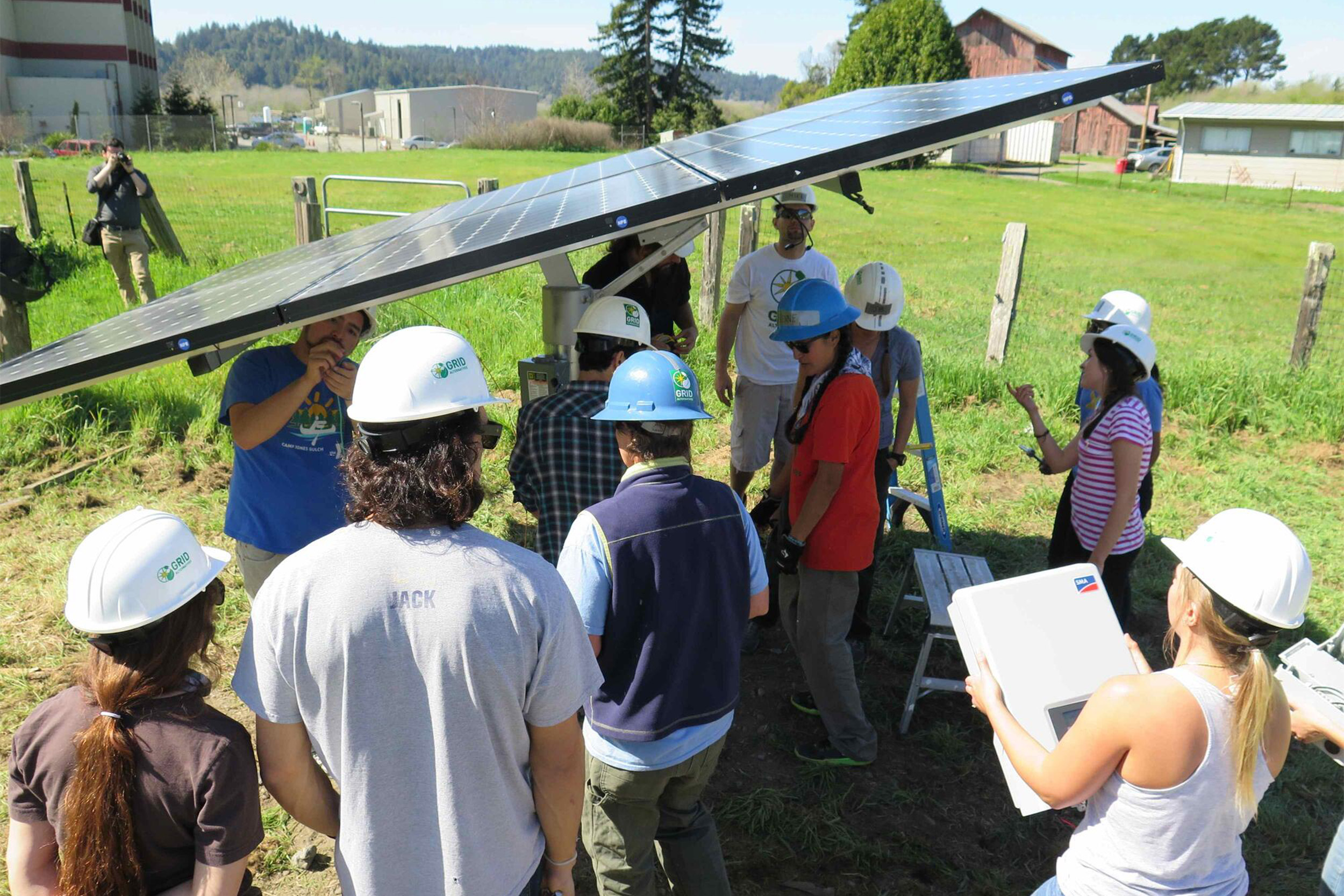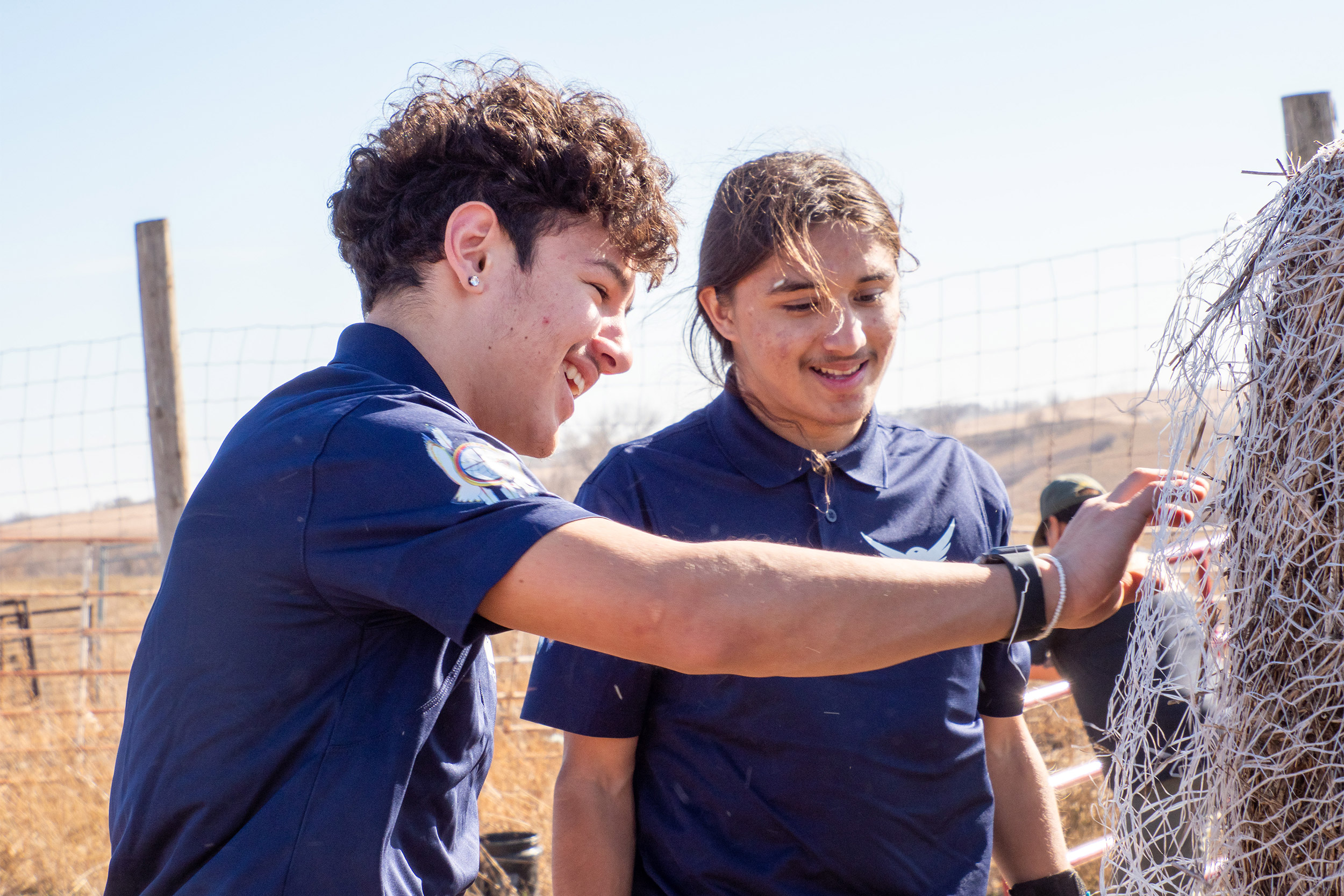
Honoring Nations, an initiative that highlights tribal government successes, recognized Blue Lake Rancheria for its climate-smart electric power sources.
Photo courtesy of Blue Lake Rancheria
Lending hand as nation-building renaissance grows in Indian Country
Harvard Kennedy School Project on Indigenous Governance and Development gets $15 million in gifts to expand research, sharing innovation, best practices
The town of Winnebago interrupts the green and brown checkerboard landscape of northeastern Nebraska with a series of roads, homes, a hospital, and a school. Decades ago, the town and surrounding area, home to the Winnebago tribe of Nebraska, looked strikingly different.
Characterized by extreme poverty for much of the 20th century, the tribe, like many other Native nations in the U.S., lacked an adequate tax system and was forced to rely on federal support. “If you’re waiting for money to come from someone who’s supposed to give you money, who resents your existence, then it’s a formula for abject poverty and despair,” says Lance Morgan, J.D. ’93, a Winnebago tribal citizen. “What does self-determination look like when you don’t control the purse strings? It looks a lot like begging. And that’s essentially what we had going on for a long time.”
Over the past three decades the tribe has managed to turn around its own fortunes through diverse, tribe-owned businesses. Morgan said tribal sovereignty was a cornerstone of the effort, as it was critical that the Winnebago be free to make necessary decisions about their future.
The turnaround has been followed closely by the HKS Project on Indigenous Governance and Development. This week, Kennedy School Dean Douglas Elmendorf announced that the project, formerly known as the Harvard Project on American Indian Economic Development, received more than $15 million in the form of multiple transformational gifts to expand its long-running efforts to research, document, and share examples of effective tribal self-governance like that of the Winnebago.
The project was founded in 1987 by Joseph Kalt, the Ford Foundation Professor of International Political Economy emeritus, and Professor Stephen Cornell (now at the University of Arizona) largely to answer this question: How have some tribes successfully strengthened their economies, cultures, and governance where others have fallen short?
After decades of studying and working with Indigenous nations like the Winnebago, Kalt is quick to answer. “Tribal economies have been developing at a prodigious rate because the federal government finally realized that if tribes had control over their own destiny, they would and could do a much better job of managing their own development,” he said.
Kalt points out that, since 1989 when the federal government adopted policies of tribal self-determination through self-government, the real, inflation-adjusted income of the average Native resident of an Indian reservation has grown more than 60 percent. The companion figure for the average U.S. resident is only 17 percent. While the deficits that tribes must overcome overall are deep and have yet to be erased, Kalt said, “the glass may only be half-full, but at last it is filling.”
Ho-Chunk, Inc. supports community and education programs, including an apprenticeship program where students gain both skills and work opportunities.
Photo courtesy of Ho-Chunk, Inc.

Consider the Winnebago. In 1994, when a new Iowa law allowing riverboat gambling threatened the modest profits of the tribe’s newly established casino, leaders knew they had to take steps to ensure the community’s economic future. The tribe wrote and enacted a business code, which allowed for the formation of tribally owned corporations to allow for diversification away from dependance on gambling revenue. From that legal overhaul Ho-Chunk Inc. was born.
Morgan, now CEO, was Ho-Chunk’s founder and first employee. He helped take an initial investment of $9 million from the tribe and turn it into a sprawling business enterprise that includes federal government contracting, real estate development, and other activities with hundreds of millions of dollars a year in revenues.
“Tribal sovereignty was a critical factor in our [Ho-Chunk’s] creation,” Morgan said, crediting the initial business code changes made by the tribe. Now, the company is a lynchpin in the Winnebagos’ economic development and central to the tribe’s efforts to provide meaningful economic opportunity to many of its citizens.
A sizable portion of Ho-Chunk’s earnings have been plowed back into the community. Perhaps most notably, the company has built an entirely new town it calls Ho-Chunk Village. Beginning in 2003, the effort has brought affordable housing, commercial and retail space, and ceremonial and recreational facilities to a community that had long lacked such infrastructure. In the process, paired with a down-payment assistance program, Ho-Chunk Village has led to a significant increase in Winnebago home ownership and expanded economic activity.
“It’s a common misconception that gambling-related businesses are a silver bullet for tribes,” Kalt said. “The research points not to casinos, but to the critical role of strong, culturally relevant government institutions that hold decision-makers accountable, reflect local needs and wants values, and allow tribes to act on their sovereignty.”
In the case of Ho-Chunk, it was the tribe’s ability to set up its own business code and economic development goals that made its efforts a success, according to Megan Minoka Hill of the Oneida Nation in Wisconsin, director of Honoring Nations, an initiative run by the Project on Indigenous Governance and Development that works to highlight tribal government successes. “If the Winnebago Tribe of Nebraska had tried to rely only on casino revenue, they would have never achieved this level of success,” Hill said.
As the sovereignty and nation-building renaissance took hold throughout Indian country, the Harvard project helped chart the course forward for many tribal leaders by documenting exemplars of excellence in tribal self-governance and providing actionable resources for and guidance on everything from tribal constitutional reform to best practices in tribally managed education reform.
Kalt teaches many of these lessons learned about tribal sovereignty and governance in the popular “Native Americans in the 21st Century: Nation Building I” taught at the Kennedy School each January. That is followed up by “Nation Building II,” taught by Eric Henson, a tribal economic development specialist, HKS adjunct lecturer in public policy, and a member of the Chickasaw Nation. Under Henson’s guidance, teams of students partner with tribal governments and enterprises to apply classroom lessons to real-world problems.
“Since 2007, the ‘Nation Building II’ course has undertaken 166 projects on behalf of dozens of tribal communities and Native organizations,” Henson said. “Over the past few years, students have consistently told me that the class is the best educational experience they have ever had. Our students frequently make lifelong connections throughout Indian Country and with their fellow classmates by participating in the course.”
“I have found it [the project] to be incredibly useful to me,” Morgan said. “Everywhere I go, tribes are advancing. The Harvard project has worked very hard to get that information out there. And so, people aren’t inventing in a vacuum anymore. When we come up with something, we’ll share it.”
As tribes experience new levels of growth, their needs are quickly changing. “Many tribes are entering a new era where they need to develop a cadre of highly trained professionals to manage increasingly complex tribal government and business operations,” Kalt said. “Just as we at Harvard Kennedy School train future leaders in the United States and in developing countries, we need to try to meet the needs of the American Indian nations.”
The newly announced gifts will help the project expand its efforts to share research and support Indigenous government leaders. Specifically, the new gifts will fund a new Julie Johnson Kidd Professorship of Indigenous Governance and Development, student engagement and outreach initiatives, and a senior leadership fellow, all focused on enhancing the project’s practical research, teaching, leadership development, and policy analysis in the arena of contemporary Indigenous affairs.
“It’s my hope that these new gifts will help develop a future pipeline of students who can take back many of the lessons we teach about the nuts and bolts of governance and leadership and apply them to Indigenous communities in this country and around the world. The gifts ensure that Harvard will be able to sustain its leadership in this space,” Kalt said.
“This is a critical time for Indigenous communities in the United States and all over the world,” said Hill. “Tribes are overcoming decades of displacement, chronic underfunding, and mistreatment to show us all what good government can and should look like. And as tribes continue to break through barriers and bring forth new ideas, these gifts help us further cement our commitment at the project and the Kennedy School to continue to be there every step of the way.”




